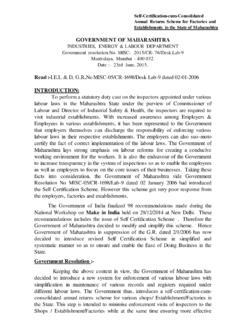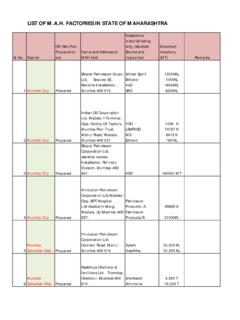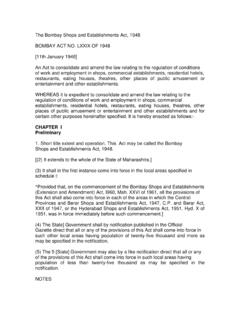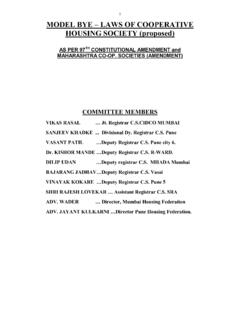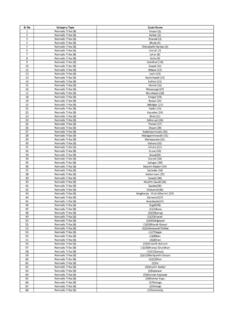Transcription of THE MAHARASHTRA RECOGNITION OF TRADE UNIONS …
1 THE MAHARASHTRA RECOGNITION OF TRADE UNIONS AND prevention OF unfair labour practices ACT, 1971. PREAMBLE MAHARASHTRA ACT NO. I OF 1972. An Act to provide for the RECOGNITION of TRADE UNIONS for facilitating collective bargaining for certain undertakings, to state their rights, and obligations; to confer certain powers on Unrecognised UNIONS ; to provide for declaring certain strikes and lock-outs as illegal strikes and lock-outs; to define and provide for the prevention of certain unfair labour practices ; to constitute courts (as independent machinery) for carrying out the purposes of according RECOGNITION to TRADE UNIONS and for enforcing the provisions relating to unfair practices ; and to provide for matters connected with the purposes aforesaid. WHEREAS, by Government Resolution, Industries and labour Department, No. IDA. 1367-LAB-II, dated the 14th February 1968, the Government of MAHARASHTRA appointed a Committee called "the Committee on unfair labour practices " for defining certain activities of employers and workers and their organisations which should be treated as unfair labour practices and for suggesting action which should be taken against employers or workers, or their organisations, for engaging in such unfair labour practices ; AND WHEREAS, after taking into consideration the report of the Committee Government is of opinion that it is expedient to provide for the RECOGNITION of TRADE UNIONS for facilitating collective bargaining for certain undertakings; to state their rights and obligations; to confer certain powers on Unrecognised UNIONS .
2 To provide for declaring certain strikes and lock-outs as illegal strikes and lock-outs; to define and provide for the prevention of certain unfair labour practices ; to constitute courts (as independent machinery) for carrying out the purposes of according RECOGNITION to TRADE UNIONS and for enforcing provisions relating to unfair practices ; and to provide for matters connected with the purposes aforesaid; It is hereby enacted in the Twenty-second Year of the Republic of India as follows :- 1. SHORT TITLE. - This Act may be called the MAHARASHTRA RECOGNITION of TRADE UNIONS and prevention of unfair labour practices Act, 1971. 2. EXTENT, COMMENCEMENT AND APPLICATION. (1) This Act extends to the whole of the State of MAHARASHTRA . (2) It shall come into force on such date as the State Government may, by notification in the Official Gazette, appoint; and different dates may be appointed for different areas and for different provision of this Act.
3 (3) Except as otherwise hereinafter provided, this Act shall apply to the industries to which the Bombay Industrial Relations Act, 1946, Bom. XI of 1947, for the time being applies, and also to any industry as defined in clause (j) of section 2 of the Industrial Disputes Act, 1947, XIV of 1947, and the State Government in relation to any industrial dispute concerning of such industry is the appropriate Government under that Act : Provided that, the State Government may, by notification in the Official Gazette, direct that the provisions of this Act shall cease to apply to any such industry from such date as may be specified in the notification; and from that date, the provisions of this Act shall cease to apply to that industry and, thereupon, section 7 of the Bombay General Clauses Act, 1904, Bom. I of 1944, shall apply to such cess or, as if this Act has been repealed in relation to such industry by a MAHARASHTRA Act.
4 3. DEFINITIONS. - In this Act, unless the context requires otherwise, - (1) "Bombay Act" means the Bombay Industrial Relations Act, 1946, Bom. XI of 1947; (2) "Central Act" means the Industrial Disputes Act, 1947, XIV of 1947; (3) "concern" means any premises including the precincts thereof where any industry to which the Central Act applies is carried on; (4) "Court" for the purposes of Chapters VI and VII means the Industrial Court, or as the case may be, the labour Court: (5) "employee" in relation to an industry to which the Bombay Act for the time being applies, means an employee as defined in clause (13) of section 3 of the Bombay Act; and in any other case, means a workman as defined in clause (s) of section 2 of the Central Act; (6) "employer" in relation to an industry to which the Bombay Act applies, means an employer as defined in clause (14) of section 3 of the Bombay Act; and in any other case, means an employer as defined in clause (g) of section 2 of the Central Act.
5 (7) "Industry" in relation to an industry to which the Bombay Act applies means an industry as defined in clause (19) of section 3 of the Bombay Act, and in any other case, means an industry as defined in clause (j) of section 2 of the Central Act; (8) "Industrial Court" means an Industrial Court constituted under section 4; (9) "Investigating Officer" means an officer appointed under section 8; (10) " labour Court" means a labour Court constituted under section 6; (11) "member" means a person who is an ordinary member of a union , and has paid a subscription to the union of not less than 50 paise per calender month : Provided that, no person shall at any time be deemed to be a member, if his subscription is in arrears for a period of more than three calendar months during the period of a six months immediately preceding such time, and the expression "membership" shall be construed, accordingly.
6 Explanation : A subscription for a calender month shall, for the purpose of this clause, be deemed to be in arrears, if such subscription is not paid within three months after the end of the calender months in respect of which it is due; (12) "order" means an order of the Industrial or labour Court; (13) "recognised union " means a union which has been issued a certificate of RECOGNITION under Chapter III; (14) "Schedule" means a Schedule to this Act; (15) "undertaking" for the purposes of Chapter III, means any concern in industry to be one undertaking for the purpose of that Chapter : Provided that, the State Government may notify a group of concerns owned by the same employer in any industry to be undertaking for the purpose of that Chapter; (16) " unfair labour practices " means unfair labour practice as defined in section 26; (17) " union " means a TRADE union of employees, which is registered under the TRADE UNIONS Act, 1926; (18) words and expressions used in this Act and not defined therein, but defined in the Bombay Act, shall, in relation to an industry to which the provisions of the Bombay Act apply, have the meanings assigned to them by the Bombay Act; and in other case, shall have the meanings assigned to them by the Central Act.
7 4. INDUSTRIAL COURT. (1) The State Government shall by notification in the Official Gazette, constitute an Industrial Court. (2) The Industrial Court, shall consist of not less than three members, one of whom shall be the President. (3) Every member of the Industrial Court shall be a person who is not connected with the complaint referred to that Court, or with any industry directly affected by such complaint: Provided that, every member shall be deemed to be connected with a complaint or with an industry by reason of his having shares in a company which is connected with, or likely to be affected by, such complaint, unless he discloses to the State Government the nature and extent of the shares held by him in such company and in the opinion of the State Government recorded in writing, such member is not connected with the complaint, or the industry.
8 (4) Every member of the Industrial Court shall be a person who is or has been a Judge of a High Court or is eligible for being appointed a Judge of such Court : Provided that, one member may be a person who is not so eligible, if he possesses in the opinion of the State Government expert knowledge of labour or industrial matters. 5. DUTIES OF INDUSTRIAL COURT. - It shall be the duty of the Industrial Court (a) to decide an application by a union for grant of RECOGNITION to it; (b) to decide an application by a union for grant of RECOGNITION to it in place of a union which has already been recognised under this Act; (c) to decided an application from another union or an employer for withdrawal or cancellation of the RECOGNITION of a union ; (d) to decide complaints relating to unfair labour practices except unfair labour practices falling in item 1 of Schedule IV; (e) to assign work, and to give directions, to the Investigating Officers in matters of verification of membership of UNIONS , and investigation of complaints relating to unfair labour practices ; (f) to decide references made to it on any point of law either by any civil or criminal court.
9 And (g) to decide appeals under section 42. 6. labour COURT. - The State Government shall, by notification in the Official Gazette, constitute one or more labour Courts, having jurisdiction in such local areas, as may be specified in such notification, and shall appoint persons having the prescribed qualifications to preside over such Courts: Provided that, no person shall be so appointed, unless he possesses qualifications (other than the qualification of age), prescribed under Article 234 of the Constitution for being eligible to enter the judicial service of the State of MAHARASHTRA ; and is not more than sixty years of age. 7. DUTIES OF labour COURT. - It shall be the duty of the labour Court to decide complaints relating to unfair labour practices described in item 1 of Schedule IV and to try offences punishable under this Act. 8. INVESTIGATING OFFICERS.
10 - The State Government may, by notification in the Official Gazette, appoint such number of Investigating Officers for any area as it may consider necessary, to assist the Industrial Court and labour Courts in the discharge of their duties. 9. DUTIES OF INVESTIGATING OFFICERS. (1) The Investigating Officer shall be under the control of the Industrial Court, and shall exercise powers and perform duties imposed on him by the Industrial Court. (2) It shall be the duty of an Investigating Officer to assist the Industrial Court in matters of verification of membership of UNIONS , and assist the Industrial and labour Courts for investigating into complaints relating to unfair labour practices . (3) It shall also be the duty of an Investigating Officer to report to the Industrial Court, or as the case may be, the labour Court the existence of any unfair labour practices in any industry or undertaking, and the name and address of the persons said to be engaged in unfair labour practices and any other information which the Investigating Officer may deem fit to report to the Industrial Court, or as the case may be, the labour Court.
